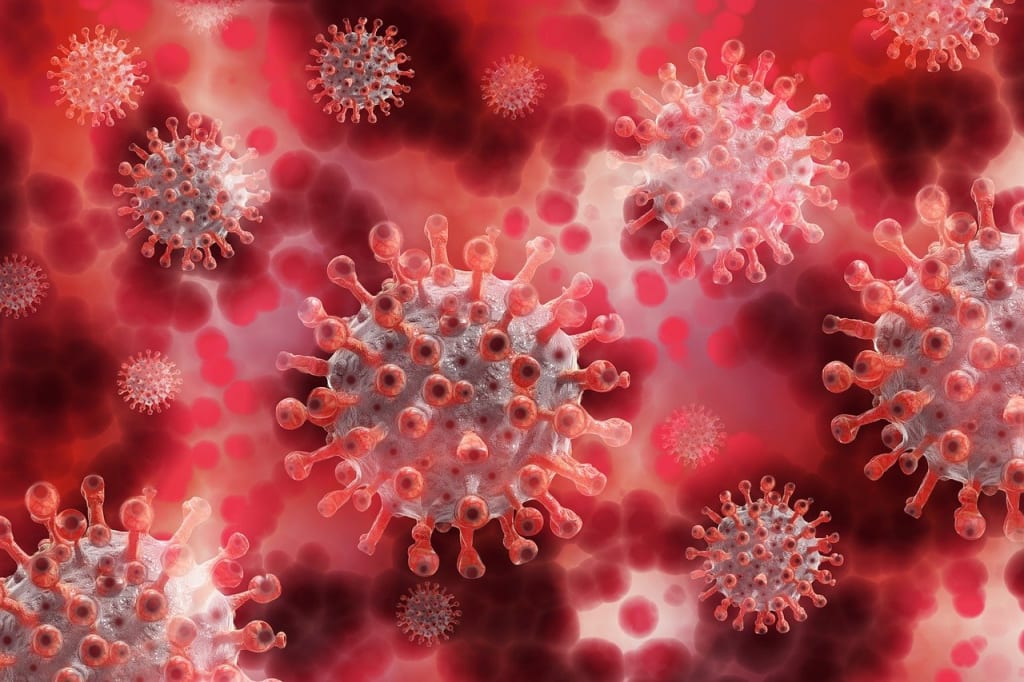New COVID-19 Symptoms: Daily Cases Surge In UK, US, Experts Warn Of Massive Jump In Hospitalisation Rate
The Rising Tide of COVID-19: New Symptoms, Surge in Cases, and a Looming Healthcare Crisis in the UK and US

Introduction
As the world adjusts to a post-pandemic reality, the specter of COVID-19 continues to loom, with new symptoms emerging and a significant rise in daily cases reported in the UK and the US. This article explores the evolving landscape of COVID-19, focusing on the newly identified symptoms, the surge in daily cases, and the alarming increase in hospitalization rates. We will delve into expert opinions, the potential causes behind these trends, and the implications for public health.
Emergence of New COVID-19 Symptoms
COVID-19, caused by the SARS-CoV-2 virus, has exhibited a broad range of symptoms since its initial outbreak. Early symptoms were primarily respiratory, including fever, cough, and shortness of breath. However, with the evolution of the virus, the spectrum of symptoms has broadened significantly, reflecting its dynamic nature and adaptation.
Neurological and Psychological Symptoms
Recent studies have highlighted an increase in neurological and psychological symptoms associated with COVID-19. These include brain fog, anxiety, depression, and cognitive impairments. Dr. Anthony Fauci, former Director of the National Institute of Allergy and Infectious Diseases (NIAID), noted that "post-acute sequelae of SARS-CoV-2 infection (PASC), often referred to as Long COVID, can manifest with a variety of neurological symptoms, which may persist for weeks or months after the acute phase of the illness."
Gastrointestinal Symptoms
New evidence suggests that gastrointestinal symptoms, such as diarrhea, nausea, and abdominal pain, have become more prevalent among COVID-19 patients. According to Dr. Michael Osterholm, Director of the Center for Infectious Disease Research and Policy at the University of Minnesota, "The virus has shown a remarkable ability to adapt and affect various body systems. Gastrointestinal symptoms are increasingly recognized as part of the clinical picture."
Dermatological Symptoms
Dermatological manifestations, such as rashes and "COVID toes" (a condition involving red or purple discoloration and swelling of the toes), are now more commonly reported. Dr. Sarah Jarvis, a UK-based General Practitioner, explained, "Skin symptoms, although less common, can be indicative of an underlying COVID-19 infection. It’s important for both patients and healthcare providers to be aware of these signs."
Surge in Daily COVID-19 Cases
The UK and the US have witnessed a notable surge in daily COVID-19 cases in recent months. Several factors contribute to this trend, including the emergence of new variants, waning immunity, and changes in public health measures.
Emergence of New Variants
New variants of SARS-CoV-2, such as the XBB.2.3 variant, have been identified as significant drivers of the recent surge in cases. These variants often exhibit mutations that enhance transmissibility and, in some cases, alter the clinical presentation of the disease. Dr. Sharon Peacock, Executive Director of the COVID-19 Genomics UK (COG-UK) Consortium, emphasized, "Variants with increased transmissibility have a substantial impact on the epidemic dynamics. The continuous monitoring and analysis of these variants are crucial for understanding their impact and for informing public health strategies."
Waning Immunity
Waning immunity, particularly among those who received their vaccinations more than six months ago, has contributed to the resurgence of COVID-19 cases. Studies indicate that the effectiveness of vaccines diminishes over time, necessitating booster doses to maintain adequate protection. Dr. Rochelle Walensky, former Director of the US Centers for Disease Control and Prevention (CDC), remarked, "We are observing a decrease in immunity over time, which highlights the importance of booster shots in sustaining high levels of protection, especially against emerging variants."
Changes in Public Health Measures
The relaxation of public health measures, such as mask mandates and social distancing, has also played a role in the recent surge of cases. As governments strive to balance economic and public health considerations, the reduction in restrictions has led to increased social interactions and a subsequent rise in virus transmission. Dr. Susan Hopkins, Chief Medical Advisor for the UK Health Security Agency (UKHSA), stated, "While it’s important to return to normalcy, we must remain vigilant and adapt our public health measures in response to the changing epidemiological situation."
Alarming Increase in Hospitalization Rates
The surge in daily cases has been accompanied by a concerning rise in hospitalization rates, particularly among vulnerable populations. Hospitals in both the UK and the US are experiencing increased pressure, with intensive care units (ICUs) nearing capacity in some regions.
Impact on Healthcare Systems
The increased hospitalization rates strain healthcare systems, leading to concerns about the capacity to manage the influx of patients. Dr. David Nabarro, Special Envoy on COVID-19 for the World Health Organization (WHO), warned, "Healthcare systems are facing tremendous pressure with the rise in hospitalizations. It’s imperative to ensure that hospitals are adequately equipped to handle the surge, including having sufficient staffing, medical supplies, and ventilators."
Risk to Vulnerable Populations
Vulnerable populations, including the elderly, immunocompromised individuals, and those with underlying health conditions, are at heightened risk of severe outcomes from COVID-19. Dr. Leana Wen, a public health professor at George Washington University, emphasized, "We must prioritize the protection of our most vulnerable citizens by ensuring access to vaccines, boosters, and early treatment options. Targeted interventions are crucial to mitigate the impact on these groups."
Expert Recommendations Expertnd Public Health Strategies
Experts advocate for a multifaceted approach to address the surge in cases and hospitalization rates, emphasizing the importance of vaccination, public health measures, and continuous monitoring of the virus.
Vaccination and Booster Campaigns
Vaccination remains a cornerstone of the strategy to combat COVID-19. Experts recommend ramping up vaccination and booster campaigns to enhance immunity levels within the population. Dr. Kate O’Brien, Director of the WHO’s Department of Immunization, Vaccines and Biologicals, stated, "Vaccination is our most effective tool in reducing severe illness and hospitalization. Increasing vaccine coverage and administering booster doses are critical steps in managing the ongoing threat posed by COVID-19."
Public Health Measures and Behavioral Interventions
Reintroducing and reinforcing public health measures, such as mask-wearing in high-risk settings, social distancing, and improved ventilation, are essential in curbing virus transmission. Dr. Monica Gandhi, an infectious disease specialist at the University of California, San Francisco, emphasized, "Public health measures should be tailored to the current epidemiological situation. Flexibility and adherence to evidence-based guidelines are key to controlling the spread of the virus."
Continuous Monitoring and Adaptation
Continuous monitoring of COVID-19 trends, including the emergence of new variants and changes in symptomatology, is vital for informed decision-making. Dr. Maria Van Kerkhove, Technical Lead for COVID-19 at the WHO, highlighted, "The virus is constantly evolving, and our response must evolve accordingly. Surveillance systems, genomic sequencing, and data analysis are crucial components of our strategy to stay ahead of the virus."
Public Health Implications and Future Outlook
The surge in COVID-19 cases and the emergence of new symptoms underscore the need for a sustained and adaptive response to the pandemic. As the virus continues to evolve, public health strategies must remain flexible and responsive to emerging challenges.
Enhancing Global Cooperation
Global cooperation and information sharing are paramount in addressing the dynamic nature of the COVID-19 pandemic. Collaborative efforts among countries, international organizations, and research institutions are essential for developing effective strategies and interventions. Dr. Tedros Adhanom Ghebreyesus, Director-General of the WHO, emphasized, "Global solidarity and cooperation are crucial in combating the COVID-19 pandemic. Sharing data, resources, and best practices will enable us to respond more effectively to the evolving threat."
Addressing Vaccine Equity
Vaccine equity remains a critical issue, particularly in low- and middle-income countries where access to vaccines and booster doses is limited. Addressing disparities in vaccine distribution is essential for achieving global control of the pandemic. Dr. Soumya Swaminathan, Chief Scientist at the WHO, stated, "Equitable access to vaccines is a moral imperative and a public health necessity. Ensuring that vaccines reach all populations, regardless of geography or economic status, is vital for ending the pandemic."
Preparing for Future Pandemics
The COVID-19 pandemic has highlighted the need for robust preparedness and response systems to address future pandemics. Investing in public health infrastructure, research, and early warning systems will enhance global resilience to emerging infectious diseases. Dr. Jeremy Farrar, Director of the Wellcome Trust, stressed, "The lessons learned from COVID-19 must inform our preparedness for future pandemics. Building resilient health systems and investing in research are critical to mitigating the impact of future outbreaks."
Conclusion
The surge in COVID-19 cases in the UK and the US, coupled with the emergence of new symptoms and the rise in hospitalization rates, presents significant challenges for public health. The dynamic nature of the virus necessitates a comprehensive and adaptive approach, emphasizing vaccination, public health measures, and continuous monitoring. As the world navigates the evolving landscape of COVID-19, global cooperation and a commitment to equity and preparedness will be essential in addressing the ongoing and future threats posed by the virus.
In conclusion, the COVID-19 pandemic continues to evolve, presenting new challenges and requiring sustained vigilance and adaptation. By prioritizing vaccination, reinforcing public health measures, and enhancing global cooperation, we can effectively manage the current surge and build resilience for future outbreaks. The lessons learned from this pandemic will shape our response to future public health crises, underscoring the importance of a coordinated and equitable approach to global health security.
About the Creator
Enjoyed the story? Support the Creator.
Subscribe for free to receive all their stories in your feed. You could also pledge your support or give them a one-off tip, letting them know you appreciate their work.





Comments
There are no comments for this story
Be the first to respond and start the conversation.